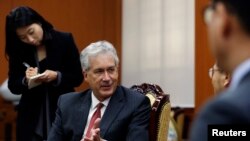The United States and South Korea are celebrating more than 60 years of a strong alliance. On a recent visit to South Korea, U.S. Deputy Secretary of State William Burns emphasized the breadth and depth of the U.S.-South Korea partnership, which extends to regional and global security issues, trade, and people-to-people relations.
With regard to North Korea and the threat it continues to pose, Deputy Secretary Burns reemphasized the strong continuing commitment of the United States to work with its allies toward the ultimate goal of a denuclearized peninsula, as well as its commitment to the defense of the Republic of Korea. The United States continues to call on North Korea to take meaningful, immediate steps toward denuclearization.
On the economic front, the U.S.-Korea Free Trade Agreement is a symbol of the deep trade relationship between the American and South Korean people. The United States is working to extend the current civil nuclear cooperation agreement and both countries are working on a successor agreement.
The United States and South Korea already cooperate on a wide range of global issues including assistance and aid to Afghanistan, the resolution of the Iranian nuclear issue, and aid for the humanitarian situation in Syria. The United States also welcomes South Korea's support for, and deepening ties with, ASEAN. South Korea's humanitarian efforts in recent months, particularly in the Philippines, are an example of South Korean leadership in the region.
The United States is committed to deepening its people-to-people ties with South Korea. More than 70,000 young Koreans are studying in the United States now and more and more Americans are studying in Korea. "I think that offers a very strong foundation," said Deputy Secretary Burns, "for the kind of people-to-people ties that can complement strong government-to-government ties."
In 2013, the United States and South Korea celebrated the 60th anniversary of their bilateral alliance. As the two countries continue to strengthen cooperation on regional and global challenges, the United States looks forward to the next 60 years of this deep and enduring partnership.
With regard to North Korea and the threat it continues to pose, Deputy Secretary Burns reemphasized the strong continuing commitment of the United States to work with its allies toward the ultimate goal of a denuclearized peninsula, as well as its commitment to the defense of the Republic of Korea. The United States continues to call on North Korea to take meaningful, immediate steps toward denuclearization.
On the economic front, the U.S.-Korea Free Trade Agreement is a symbol of the deep trade relationship between the American and South Korean people. The United States is working to extend the current civil nuclear cooperation agreement and both countries are working on a successor agreement.
The United States and South Korea already cooperate on a wide range of global issues including assistance and aid to Afghanistan, the resolution of the Iranian nuclear issue, and aid for the humanitarian situation in Syria. The United States also welcomes South Korea's support for, and deepening ties with, ASEAN. South Korea's humanitarian efforts in recent months, particularly in the Philippines, are an example of South Korean leadership in the region.
The United States is committed to deepening its people-to-people ties with South Korea. More than 70,000 young Koreans are studying in the United States now and more and more Americans are studying in Korea. "I think that offers a very strong foundation," said Deputy Secretary Burns, "for the kind of people-to-people ties that can complement strong government-to-government ties."
In 2013, the United States and South Korea celebrated the 60th anniversary of their bilateral alliance. As the two countries continue to strengthen cooperation on regional and global challenges, the United States looks forward to the next 60 years of this deep and enduring partnership.




